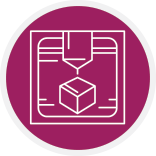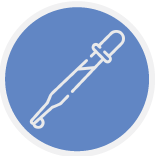The emphasis in Advanced Manufacturing is sponsored by the Toronto Institute for Advanced Manufacturing (TIAM), and was developed specifically to give U of T MEng students experience with advanced manufacturing topics.
The manufacturing sector has long been a strategic driver wealth creation in societies and has affected improvements to standards of living and quality of life. Disruptive technologies are central to this sector – technologies that will drive forward dramatic changes in the coming decades.
MEng students can choose to take courses from one of two streams: Manufacturing Management or Manufacturing Engineering.
Students who complete the requirements of the emphasis will have it notated on their transcript.
Program Eligibility
Graduate students registered in the following MEng programs can specialize in the Advanced Manufacturing emphasis:
- University of Toronto Institute for Aerospace Studies (UTIAS)
- Department of Chemical Engineering & Applied Chemistry (ChemE)
- Department of Materials Science & Engineering (MSE)
- Department of Mechanical & Industrial Engineering (MIE)
You cannot apply to the emphasis directly as a standalone program. If you are a prospective student, you can learn more about applying to our MEng programs here.
Careers
Graduates from the Advanced Manufacturing emphasis are employed by companies across a range of industries, including:
- construction,
- consulting,
- energy,
- IT,
- manufacturing,
- mining
and more.
Some of the most common jobs students acquire after graduation are:
- Design specialist
- Engineering analyst (quality control)
- Metallurgist
- Process engineering specialist
- Research & development engineering
- Safety & reliability engineer
Emphasis Requirements
MEng students can earn an emphasis in Advanced Manufacturing by completing:
- Four courses, including at least one core course
- The remaining three courses may be other core courses, or any of the elective courses in either the Manufacturing Management stream or the Manufacturing Engineering stream
- There is no requirement that the courses be chosen from just one stream.
Some courses may satisfy the requirements of multiple emphases. Students may double-count a maximum of one course towards the requirements of any two emphases.
Students cannot earn more than two emphases.
Core Courses
- AER501H: Advanced Mechanics of Structures
- AER1403H: Advanced Aerospace Structures
- APS1028H: Operations and Production Management for Manufacturing and Services
- CHE1123H: Liquid Biofuels
- MIE1740H: Smart Materials and Structures
- MIE519H1: Advanced Manufacturing Technologies
Elective Courses
Manufacturing Management stream
Manufacturing Management courses are for students who seek to move into positions of leadership in industry. Students will obtain fundamental knowledge and develop an understanding of the operational complexity of enterprises, innovation management, manufacturing and business process improvement/optimization, and integrated product/process/system design. In addition, students will develop the cognitive skills to critically evaluate the potential benefits of alternative manufacturing strategies; to use virtual/simulated platforms to facilitate and improve business processes; and to analyze enterprise systems as interacting units, components, and subsystems.
- APS1005H: Operations Research for Engineering Management
- APS1420H: Technology, Engineering and Global Development
- APS1012H: Management of Innovation in Engineering
- APS1013H: Applying Innovation in Engineering
- APS1014H: Advanced Project Management
- APS1017H: Supply Chain Management and Logistics
- APS1020H: International Business for Engineers
- APS1023H: New Product Innovation
- APS1088H: Entrepreneurship for Business
- TEP1011H: Concepts and Application of Authentic Leadership
- TEP1026H: Positive Psychology for Engineers
- TEP1501H: Leadership and Leading in Groups and Organizations
- CHE561H: Risk Based Safety Management
- CHE1434H: Six Sigma for Chemical Processes
- MIE523H: Engineering Psychology and Human Performance
- MIE562H: Scheduling
- MIE1505H: Enterprise Modeling
- MIE1514H: Systems Design and Engineering – A Product Perspective
- MIE1715H: Life Cycle Engineering
- MIE1721H: Reliability
- MIE1723H: Engineering Maintenance Management (no longer offered as of Fall 2024)
- MIE1727H: Statistical Methods of Quality Assurance
Manufacturing Engineering stream
Manufacturing Engineering courses focus on advanced and emerging manufacturing technologies and skills that can be used to increase the efficiency, productivity and profitability of modern manufacturing industry. Students will obtain an understanding of specific advanced and emerging manufacturing technologies and skills, and how to implement these technologies in the manufacturing sector in Ontario and in Canada, within key industrial sectors such as automotive, aerospace, electronics and biomedical.
- APS1005H: Operations Research (not offered at this time)
- ROB521H: Mobile Robotics and Perception
- AER1415H: Optimization Concepts and Applications
- CHE1134H: Advances in Bioengineering
- CHE1475H: Biocomposite Materials
- MIE506H: MEMS Design and Microfabrication
- MIE540H: Product Design
- MIE1706H: Manufacturing of Cellular and Microcellular Polymers
- MIE1709: Continuum Mechanics
- MIE1713H: Analysis and Design of Joints in Manufactured Products
- MIE1718H: Computer Integrated Manufacturing
- MIE1743H: Axiomatic Design Principles for Conceptual and Embodiment Design
- MSE1058H: Nanotechnology in Alternate Energy Systems
- MSE1061H: Engineered Ceramics
- MSE1015H: Mechanical Properties of Solids I
- MSE1028H: Advanced Materials Science
- MSE1029H: Electrochemical Synthesis of Nanomaterials
- MSE1031H: Forensic Engineering
- MSE543H: Composites Materials Engineering
- ROB501H: Computer Vision for Robotics
Questions?
If you have questions about the Advanced Manufacturing emphasis, please contact the Toronto Institute of Advanced Manufacturing (TIAM): tiam@utoronto.ca.
For more information, visit the MEng emphases FAQ page »









